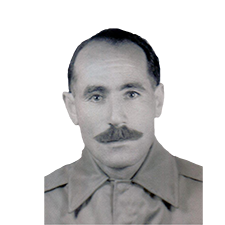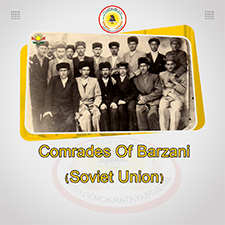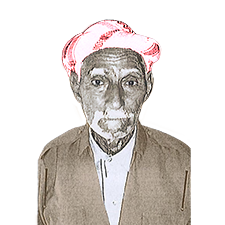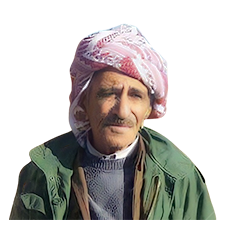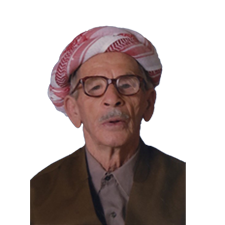Biography
He was born in Bedud village, Piran semi-district, Mergasur district, Erbil province, in 1920. He studied in the Soviet Union and received an institute degree from the Soviet Department of Agriculture. He married Habiba Mahmood Ahmed in 1956 in the Soviet Union and they had two daughters, Shazi Salim Khan and Fatma Salim Khan. His wife was from the Tatar ethnic group of the Crimean Peninsula. Salim Khan was fluent in Kurdish and Russian. He died in 1991 in Shino and was buried there.
Service Record
On October 11, 1945, after the collapse of the Second Barzan Revolution, he moved to East Kurdistan with his family. On March 31, 1946, he joined the Barzani forces of the Kurdistan Democratic Republic Army. After the failure of the Kurdistan Democratic Republic on March 19, 1947, he participated in the battle of Shino and Naghdeh (East Kurdistan). He was one of the Peshmergas who returned to Sherwan and Mazuri on April 19, 1947, through Khawkurk and Barazgar in the territory of North Kurdistan.
After their return, General Mustafa Barzani held a meeting with his comrades in Argosh village on May 15, 1947. President Barzani gave his comrades a free choice: to stay or company him to the Soviet Union. All of his comrades decided to continue and go to the Soviet Union. On May 23, 1947, Saleem accompanied General Mustafa Barzani to the Soviet Union and participated in the battle of Qtur People and the Battle of Mako Bridge. On June 18, 1947, he crossed the Aras River on the border between Iran and the Soviet Union heading towards the Soviet Union.
After arriving in the Soviet Union, on June 19, 1947, he and all his comrades were detained in Nakhchivan, Azerbaijan, for forty days in an open community surrounded by barbed wire and guarded by soldiers. In terms of food, clothing, and transportation, they had been treated as prisoners of war. They were later divided into the regions of Aghdam, Lachin, Ayulakh, and Kalbajar in the Republic of Azerbaijan on the decision of the Soviet government. On December 10, 1947, they were transferred to a military base on the Caspian Sea in Baku, the capital of the Republic of Azerbaijan. On the 23rd of the same month, they were given military uniforms and received eight hours of daily military training under the supervision of officers of the Republic of Azerbaijan. At the same time, they were taught Kurdish for four hours a day by some of their educated comrades.
After Jaafar Bakirov's mistreatment of his comrades, Barzani decided to move his military camp from Azerbaijan on August 29, 1948 to the community of Chirchuk near Tashkent, the capital of Uzbekistan, where they continued their military training.
In March 1949, he and his comrades were distributed by train to the villages of the Soviet Union and worked on the farms of the “Kolkhozes” (land that people rented from the government, and then they gave a share of the product to the government).
After much effort and sending several letters by General Barzani to Stalin, Stalin finally received a letter in which President Barzani talked about the suffering of his comrades. He immediately decided to form a committee to investigate the situation of President Barzani's comrades. The committee finally decided to gather them all in Vrevsky, so in November 1951, General Barzani went to Vrevsky, Soviet Union.
After the July 14, 1958 revolution in Iraq and the return of General Mustafa Barzani, on February 25, 1959, according to both Articles 3 and 7, paragraph (a) of Article 10 and according to Article (11), and based on the amended law No. 19, General Mustafa Barzani and his comrades were granted a general amnesty.
In 1958, the Iraqi Republic was established under the leadership of Abdul Karim Qasim. On April 16, 1959, President Barzani returned to Kurdistan with his comrades on the Groza ship through the port of Basra in southern Iraq. Saleem lived in Shaqlawa for a while and later settled in Bidod village. He participated in the September Revolution in 1963. In 1975, after the failure of the September Revolution, he moved to Iran as a refugee and settled in Shino. He participated in the May Revolution with his two sons.
Sources:
-
حهمید گهردی، پوختهی مێژوونامه، چاپی یهكهم، (ههولێر - دهزگای چاپ و بڵاوكردنهوهی ئاراس - چاپخانهی وهزارهتی پهروهرده - ٢٠٠٤ز).
-
سهبری چاوشین خانۆ، بێدۆد له مێژوودا، (ههولێر – چاپخانهی رۆژههڵات - ٢٠١٨ز).
-
سهفهر یووسف میرخان، چیرۆكی دایكه حهبیبا و گهرانهوهی بۆ كوردستان، رۆژنامهی خهبات، ئۆرگانی پارتی دیموكراتی كوردستان، ژماره ٣٤٦٢، ههولێر، ٤ ئایاری ٢٠١٠ز.
-
سهفهر یووسف میرخان، هاوسهری ههڤاڵێكی بارزانی نهمر كۆچی دووایی كرد، رۆژنامهی خهبات، ئۆرگانی پارتی دیموكراتی كوردستان، ژماره ٤٥٤٧، ههولێر، ٢١ نیسانی ٢٠١٤ز.
-
شهوكهت شێخ یهزدین، یۆبیلی زێڕینی پێشمهرگه، (پیرمام - چاپخانه خهبات - ١٩٩٦ز).
-
صالح یوسف صوفي، كرۆنۆلۆژیا كوردستانێ و جیهانێ، چاپا ئێكێ، بهرگێ دووێ، (دهۆك - چاپخانا پارێزگهها دهۆكێ - ٢٠١٣ز).
-
صالح یوسف صوفي، كرۆنۆلۆژیا كوردستانێ و جیهانێ، چاپا ئێكێ، بهرگێ سێ، (دهۆك - چاپخانا پارێزگهها دهۆكێ - ٢٠١٣ز).
-
كاروان محهمهد مهجید، بارزانییهكان له مههابادهوه بۆ سۆڤێت، چاپی یهكهم، (سلێمانی - چاپخانهی پهیوهند - ٢٠١١ز).
-
گۆڤاری ههتاو، ژماره ١٥٤، ساڵی شهشهم، ههولێر، چاپخانهی كوردستان، ههینی، ١٥ نیسانی ١٩٥٩.
-
له یادداشتی فهرماندهی شههید حهسۆ میرخان ژاژۆكی، ٦٢ رۆژ لهگهڵ بارزانی دا چوونی بارزانییهكان بۆ یهكێتی سۆڤێت، چاپی یهكهم (ههولێر - چاپخانهی رۆشنبیری - ١٩٩٧ز).
-
م.ئهحمهد محهمهد چیچۆ، بۆ مێژوو له یاداشتی محهمهد چیچۆ پێندرۆیی، چاپی یهكهم، (ههولێر - چاپخانهی شههاب - ٢٠١٠ز).
-
مسعود بارزانی، بارزانی و بزوتنهوهی رزگاریخوازی كورد ١٩٣١ - ١٩٥٨، (دهۆك - چاپخانهی خهبات - ١٩٩٨ز).
-
ئـ.د.ئـ، فایلی ژماره AI-١٠، لیستی ههڤاڵانی مستهفا بارزانی بۆ یهكێتی سۆڤێت، بهڵگهنامه لهلایهن سهگڤان هاڵۆ پێشكهش كراوه، ٢٠١٦ز.
-
ئـ.د.ئـ، فایلی ژماره HB-١٥٧، پارتی دیموكراتی كوردستان، بارهگای بارزانی، لێژنهی باڵای ناوچهی بارزان، فۆرمی سهلیم خان مهرعان عومهر مستهفا، پیرمام، ١ تشرینی دووهمی ٢٠١٨ز.
-
ئـ.د.ئـ، فایلی ژماره ZB-١٨٩، دهقی چاوپێكهوتن لهگهڵ سلێمان سهلیم خان مهرعان لهلایهن سامی عهبدی، پیرمام، ٩ شوباتی ٢٠٢٠ز، ل ل ١-٢.




